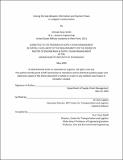Closing the gap between information and payment flows in a digital transformation
Author(s)
Smith, Michael Sean,M. Eng.Massachusetts Institute of Technology.
Download1191824464-MIT.pdf (1.586Mb)
Other Contributors
Massachusetts Institute of Technology. Supply Chain Management Program.
Advisor
Chris Caplice.
Terms of use
Metadata
Show full item recordAbstract
Companies spend significant resources on digital transformation projects that do not always meet expectations. This thesis contends that these projects fail or fall short because organizations do not consider the three fundamental flows of a supply chain; material, information, and payment. To address the issue, this thesis develops a lens to identify mismatches between material, information, and payment flows, and applies this lens to putaways and the post goods receipt process in the US Army's supply chain. The thesis identifies an increased risk of loss for putaways confirmed before physical movement could take place, and confirmations that occurred after seven days. The thesis recommends measuring putaway time as a key performance indicator and establishing a two duty-day key performance standard, which would hypothetically lead to a reduced rate of loss. With respect to the post goods receipt process, it was found that a failure to confirm goods receipt led to the creation of millions of dollars in phantom inventory and late payments. This thesis recommends allowing customers to pay for material even if intermediate digitized information flows were not confirmed. It also recommends monitoring material available to be received so that leaders can spot and address errors. By considering the three fundamental flows of a supply chain, digital transformation practitioners can achieve better results.
Description
Thesis: M. Eng. in Supply Chain Management, Massachusetts Institute of Technology, Supply Chain Management Program, May, 2020 Cataloged from the official PDF of thesis. Includes bibliographical references (pages 53-58).
Date issued
2020Department
Massachusetts Institute of Technology. Supply Chain Management ProgramPublisher
Massachusetts Institute of Technology
Keywords
Supply Chain Management Program.